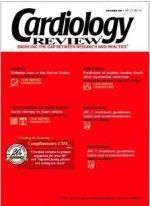Publication
Article
Not all GP IIb/IIIa drugs are the same Stanley Katz, MD
The study by McLellan and colleagues (page 18) is a subanalysis of the Enhanced Suppression of the Platelet IIb/IIIa Receptor with Integrilin Therapy (ESPRIT) trial, which randomly assigned more than 2,000 patients undergoing nonurgent coronary stent implantation to receive either placebo or the glycoprotein (GP) IIb/IIIa inhibitor eptifibatide.
The primary end point of this trial was a composite of death, myocardial infarction, urgent target vessel revascularization, or bailout use of the drug for acute stent throm-bosis within 48 hours. Secondary end points included these same end points examined at 30 days, 6 months, and 1 year.
Because previous trials with similar drugs have suggested a greater benefit for diabetic patients, this study evaluated the diabetic patients in the ESPRIT trial. Patients were selected based on the medical history and included diet-controlled diabetic patients.
The diabetic patients were compared with the nondiabetic patients in baseline and procedural characteristics, and for differences in outcomes at 48 hours and 30 days. Of the 2,061 patients randomized, there were 466 (22.6%) patients classified as diabetic and 1,595 (77.4%) classified as nondiabetic.
Diabetic patients were more likely to be women (37.6% versus 24.2%; P = .001), hypertensive (71.7% versus 55%; P = .001), heavier (89 kg versus 83.5 kg; P ≤ .001), and to have had a previous coronary procedure (26.8% versus 22.4%; P = .046). Diabetic patients tended to have longer procedure times.
There was no difference in primary end points between the two groups (diabetic versus nondiabetic patients) at 48 hours or 30 days. At
6 months, however, the diabetic patients fared worse, with a composite end point reached in 20.9% versus 15% in the nondiabetic patients (P = .008). This difference continued at 1 year with 24.5% of diabetic patients reaching an end point versus 18.4% in the non-
diabetic patients (P = .008). This was mostly driven by target vessel re-vascularization, and one can only speculate whether results would have been better with drug-eluting stents. When the same analysis was carried out comparing eptifibatide with placebo, the drug did not confer any advantage to the diabetic patients as was seen in the Evaluation of Platelet IIb/IIIa Inhibitor for Stenting Trial (EPISTENT)1 in which the drug abciximab was used.
Conclusion
This substudy showed how diabetic patients fare worse with coronary intervention. This was shown with percutaneous transluminal coronary angioplasty in the Bypass Angioplasty Revascularization Investigation (BARI),2 and now with stents in this trial. Eptifibatide did not seem to confer any additional protection for diabetic patients undergoing nonurgent stent deployment, especially with regard to restenosis.
